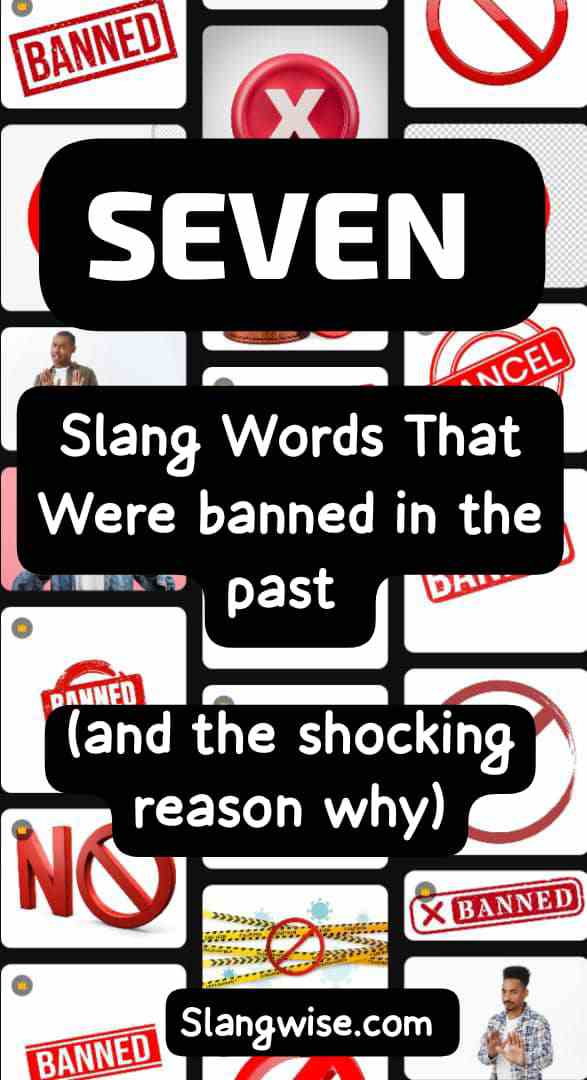Language evolves, but so do the rules about what’s acceptable. Over the past century, seemingly innocuous slang words have been slapped with bans, blacklists, or censorship. Below are seven notable cases, and the often surprising reasons why these terms were deemed too scandalous for public use.
Slangwise Tip: Words have power, what seems harmless today might shock tomorrow.
Table of Contents
1. Bloody
In early 20th-century Britain, the word bloody was treated as a serious profanity.
Ban & Enforcement: The BBC’s language policy officially barred bloody from radio and television broadcasts well into the 1930s and ’40s. Any on-air slip risked an apology, and, in extreme cases, suspension of the offending announcer.
Shocking Reason: The term was considered a blasphemous reference to blood, touching on themes of gore and violence that Victorian-era sensibilities found offensive. Regulators saw it as too crude for “polite society.”
Today: Today bloody is mild in the UK, but its history shows how context and public morals shape censorship. Source: Wikipedia, “Bloody (slang)”
2. Damn
In the United States, damn carried heavy religious connotations. From the 1920s until 1971, the Federal Communications Commission (FCC) prohibited damn on radio and television under its indecency rules. Broadcasters faced fines and license threats for lapsing.
Shocking Reason: Regulators deemed invoking damnation a form of profanity. In an era of strong Protestant influence, any perceived disrespect toward the concept of divine judgment was unacceptable in family-oriented programming.
Today: The watershed moment came when musicians challenged the ban, in 1971, Joan Baez’s performance of “The Night They Drove Old Dixie Down,” which included damn, prompted the FCC to relax its stance.
3. Hell
Alongside damn, the word hell was lumped into America’s broadcast profanity list. Also banned by the FCC until the early 1970s, hell was considered an indecent allusion to damnation. Some local stations went even further, editing out the word from syndicated programming.
Shocking Reason: Religious leaders worried that casual use of hell eroded respect for sacred concepts. The broader cultural aim was to shield families, especially children, from irreverence.
Today: Today, hell is generally permitted, though some stations still carry internal guidelines discouraging its overuse during children’s hours.
Read also: 14 bad internet slangs parents should caution their children from saying.
4. Bum
In British English, bum originally referred innocuously to the buttocks, but it raised eyebrows when used colloquially. The BBC labeled bum as “mildly vulgar” in its 1950s listings. While not outright banned, announcers were urged to avoid it, and any use in scripts required special clearance.
Shocking Reason: At the time, any reference to body parts outside the head–torso–limb norm was seen as indecent. The word’s anatomical implication was enough to trigger censorship under BBC standards.
Today: Modern audiences find bum virtually harmless, but this episode shows how quickly norms shift.
5. Sodding
A much stronger British intensifier than “bloody,” sodding is a derivative of “sod”, itself a medieval term of abuse. Like bloody, sodding was proscribed on BBC radio through the 1950s. The Corporation’s style guide described it as “offensive” and “to be omitted at all costs.”
Shocking Reason: The religious roots of “sod” (linked to the biblical “Sodom”) gave the term a perceived sexual and moral charge. It wasn’t merely a crude slang, it carried echoes of sin.
Today: Today sodding remains much less common than its milder cousins. Its history serves as a reminder of the power of inferred meaning.
6. OMG
While OMG (short for “oh my god”) emerged in the digital age, its history of censorship is surprisingly recent. In 2010, a North Carolina school board banned students from writing OMG in assignments, citing it as disrespectful to religious beliefs. Similar policies appeared in other U.S. districts, students risked grade penalties for using the term.
Shocking Reason: Administrators argued that even written shorthand for God invoked the divine improperly. In regions with strong religious identities, the abbreviation was seen as mockery or frivolous irreverence.
Today: The bans sparked nationwide debate over free expression in schools. Most districts eventually repealed the rules amid public outcry and legal threats.
7. WTF
Now ubiquitous online, WTF (short for “what the f*ck”) once triggered automatic filter. Early versions of Twitch, YouTube comment sections, and corporate email servers blocked WTF outright. Employees could be reprimanded for using it in internal communications.
Shocking Reason: The full-term f*ck has long been taboo for its sexual explicitness. Even an acronym was deemed profane by content-moderation systems and corporate policy manuals.
Today: While WTF survives on most platforms, automated filters still flag it in formal documents or during live broadcasts, proof that digital communities maintain their own speech codes.
Lessons from History
These bans reveal more than shifting language tastes; they expose how institutions, governments, broadcasters, schools, and platforms, seek to control discourse. The word itself may be only three or four letters, but its impact on society can be profound.
- Cultural Values: What’s offensive often reflects broader moral or religious norms.
- Power of Context: A harmless term in one era can be explosive in another.
- Authority & Rebellion: Attempts to ban words frequently spur popular backlash.
- Ongoing Evolution: Today’s tame slang might be tomorrow’s target, and vice versa.
Final Thought
Language is never static. The next time a seemingly innocent term raises eyebrows, remember these seven cases. They stand as a testament to the sometimes surprising power of slang, and the equally surprising reasons why it can be banned.

